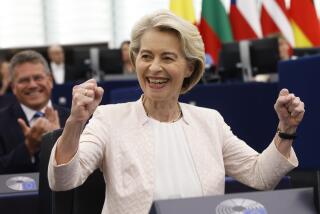EC Leaders at Sea Over Danish Rejection : Europe: Vote against Maastricht Treaty blocks the march to unity. Expansion plans may also be in jeopardy.
- Share via
BRUSSELS — Western Europe’s political leaders scrambled Wednesday to maintain their march toward political and economic unity in the wake of the stunning decision by Danish voters to drop out of formation.
No matter how well the politicians succeed, however, the Danish vote could leave a long-lasting blot on Europe’s ambitions to act as a world-class economic and diplomatic player. More narrowly, it could also interfere with the expansion plans of the 12-nation European Community.
By fewer than 50,000 votes, Danes on Tuesday rejected a treaty negotiated by the heads of the 12 EC countries for a single European currency and common European positions on everything from foreign policy to workers’ rights.
French President Francois Mitterrand, seeking public approval for the treaty in the wake of the Danish vote, announced a popular referendum, probably in the fall. Originally, French ratification was to be left to the Parliament, which is also debating the treaty and where approval is expected.
Officials of the European Commission, the Community’s policy-formulating body, said the Danish vote will complicate their efforts to unify Europe, starting with the so-called EC-92 program for bringing down barriers to movement within the Community of goods, services, money and people by the end of this year.
Danish officials appealed to the Community on Wednesday to revise the treaty, which was agreed to last December at the Dutch town of Maastricht. But leaders of the other 11 EC nations vowed instead to press on for ratification of the existing treaty, even if that means leaving Denmark behind.
France and Germany, often referred to as the Community’s “twin pillars,” issued a joint statement regretting the Danish vote and declaring their determination to press ahead with ratification in the other 11 EC nations by the end of the year.
“France and Germany affirm together their intention to pursue firmly the construction of the European union,” said Mitterrand and German Chancellor Helmut Kohl.
Mitterrand’s surprise announcement of a French referendum is a gamble both for himself and Europe, observers said. Polls in France have shown firm majorities in favor of the treaty, and the president, whose personal popularity ratings have been low, is hoping that the treaty’s popularity will rub off on him, said Dominique Moisi, deputy director of the French Institute for International Relations.
A no vote, Moisi said, would be a disaster for both Mitterrand and for European union.
In addition to France, Ireland has scheduled a referendum for June 18. There, sentiment is complicated by charges that the treaty would facilitate abortions in that strongly Roman Catholic country. Supporters of the treaty argue that it would increase the flow of financial aid from the wealthier Community nations.
The other nine Community countries intend to let their national legislatures decide whether to ratify.
Denmark’s Parliament had itself voted on the treaty, and the outcome was a lopsided 130 in favor and 25 opposed.
Stanley Crossick, chairman of the Belmont European Policy Center in Brussels, said the Danish vote suggests that Europe’s political leaders have gotten out ahead of the public in their drive for unity. Only in Britain, he said, was there a broad public debate before the heads of the 12 EC nations approved the treaty in Maastricht.
Moisi called the Danish vote “a warning to politicians that they have to deal with public opinion.”
In Tuesday’s popular vote, opposition came from both the far left and the far right, making it difficult to revise the treaty to Denmark’s satisfaction. Also, reopening the treaty could invite changes that might erode support for the treaty in the other 11 Community countries, observers said.
“I do not accept any renegotiation of the treaty to satisfy any demands by Denmark,” declared Portuguese Prime Minister Anibal Cavaco Silva.
Left uncertain was exactly how the treaty, which under Community rules was to have required ratification by all 12 members, could take effect in only 11. Most analysts said the Community’s legal experts could probably find a way over this hurdle, perhaps by reformulating the treaty as a separate appendix to the Community’s constitution rather than as part of the constitution itself.
Portuguese Foreign Minister Joao de Deus Pinheiro suggested that Denmark might do best to withdraw from the Community.
Some experts predicted that Denmark will find a way to reverse Tuesday’s vote. They said Danes, when they realize the costs of being left out of an otherwise united Europe, would climb back on the European bandwagon.
“I would take a mild wager that by Jan. 1 of next year, all the EC countries will be on board, including the Danes,” said Peter Ludlow, director of the Brussels-based Center for European Policy Studies.
Times staff writer Rone Tempest in Paris contributed to this report.
More to Read
Sign up for Essential California
The most important California stories and recommendations in your inbox every morning.
You may occasionally receive promotional content from the Los Angeles Times.













